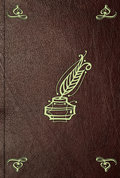
Вашингтон Ирвинг
The Student's Life of Washington; Condensed from the Larger Work of Washington Irving
CHAPTER VII.
A CAMPAIGN UNDER GENERAL BRADDOCK
Having resigned his commission, and disengaged himself from public affairs, Washington's first care was to visit his mother, inquire into the state of domestic concerns, and attend to the welfare of his brothers and sisters. In these matters he was ever his mother's adjunct and counsellor, discharging faithfully the duties of an eldest son, who should consider himself a second father to the family. He now took up his abode at Mount Vernon, and prepared to engage in those agricultural pursuits, for which, even in his youthful days, he had as keen a relish as for the profession of arms. Scarcely had he entered upon his rural occupations, however, when the service of his country once more called him to the field.
The disastrous affair at the Great Meadows, and the other acts of French hostility on the Ohio, had roused the attention of the British ministry, who now prepared for military operations in America; none of them professedly aggressive, but rather to resist and counteract aggressions. A plan of campaign was devised for 1755, having four objects: To eject the French from lands which they held unjustly, in the province of Nova Scotia; to dislodge them from a fortress which they had erected at Crown Point, on Lake Champlain, within what was claimed as British territory; to dispossess them of the fort which they had constructed at Niagara, between Lake Ontario and Lake Erie; to drive them from the frontiers of Pennsylvania and Virginia, and recover the valley of the Ohio. The Duke of Cumberland, captain-general of the British army, had the organization of this campaign; and through his patronage, Major-general Edward Braddock was intrusted with the execution of it, being appointed generalissimo of all the forces in the colonies.
Braddock was a veteran in service, and had been upwards of forty years in the guards, that school of exact discipline and technical punctilio. He was a brave and experienced officer; but his experience was that of routine, and rendered him pragmatical and obstinate, impatient of novel expedients, and his military precision, which would have been brilliant on parade, was a constant obstacle to alert action in the wilderness. He was to lead in person the grand enterprise of the campaign, that destined for the frontiers of Virginia and Pennsylvania; it was the enterprise in which Washington became enlisted, and, therefore, claims our especial attention.
Prior to the arrival of Braddock, came out from England Lieutenant-Colonel Sir John St. Clair, deputy quartermaster-general, eager to make himself acquainted with the field of operations. He made a tour of inspection, in company with Governor Sharpe, of Maryland, and appears to have been dismayed at sight of the impracticable wilderness, the region of Washington's campaign. From Fort Cumberland, he wrote in February to Governor Morris, of Pennsylvania, to have the road cut, or repaired, toward the head of the river Youghiogeny, and another opened from Philadelphia for the transportation of supplies. Unfortunately the governor of Pennsylvania had no money at his command, and was obliged, for expenses, to apply to his Assembly, "a set of men," writes he, "quite unacquainted with every kind of military service and exceedingly unwilling to part with money on any terms." However, by dint of exertions, he procured the appointment of commissioners to explore the country, and survey and lay out the roads required. At the head of the commission was George Croghan, the Indian trader, whose mission to the Twightwees we have already spoken of.
When Sir John St. Clair had finished his tour of inspection he descended Wills' Creek and the Potomac for two hundred miles in a canoe to Alexandria, and repaired to Virginia to meet General Braddock. The latter had landed on the 20th of February, at Hampton, in Virginia, and proceeded to Williamsburg to consult with Governor Dinwiddie. Shortly afterwards he was joined there by Commodore Keppel, whose squadron of two ships-of-war, and several transports, had anchored in the Chesapeake. On board of these ships were two prime regiments of about five hundred men each – one commanded by Sir Peter Halket, the other by Colonel Dunbar; together with a train of artillery, and the necessary munitions of war. The regiments were to be augmented to seven hundred men, each by men selected by Sir John St. Clair from Virginia companies recently raised. Alexandria was fixed upon as the place where the troops should disembark and encamp. The ships were accordingly ordered up to that place, and the levies directed to repair thither.
The plan of the campaign included the use of Indian allies. Governor Dinwiddie had already sent Christopher Gist to engage the Cherokees and Catawbas, the bravest of the Southern tribes, who he had no doubt would take up the hatchet for the English, peace being first concluded, through the mediation of his government, between them and the Six Nations; and he gave Braddock reason to expect at least four hundred Indians to join him at Fort Cumberland. General Braddock apprehended difficulty in procuring wagons and horses sufficient to attend him in his march. Sir John St. Clair, in the course of his tour of inspection, had met with two Dutch settlers, at the foot of the Blue Ridge, who engaged to furnish two hundred wagons and fifteen hundred carrying horses, to be at Fort Cumberland early in May. Governor Sharpe was to furnish above a hundred wagons for the transportation of stores, on the Maryland side of the Potomac. Keppel furnished four cannons from his ships, for the attack on Fort Duquesne, and thirty picked seamen to assist in dragging them over the mountains. They were to aid also in passing the troops and artillery on floats or in boats, across the rivers, and were under the command of a midshipman and lieutenant.
Trusting to these arrangements, Braddock proceeded to Alexandria. The troops had all been disembarked before his arrival, and the Virginia levies, selected by Sir John St. Clair to join the regiments of regulars, were arrived. There were beside two companies of hatchet men, or carpenters, six of rangers, and one troop of light horse. The levies, having been clothed, were ordered to march immediately for Winchester to be armed. The light horse were retained by the general as his escort and body guard.
The din and stir of warlike preparation disturbed the quiet of Mount Vernon. Washington looked down from his rural retreat upon the ships of war and transports as they passed up the Potomac, with the array of arms gleaming along their decks. The booming of cannon echoed among his groves. Alexandria was but a few miles distant. Occasionally he mounted his horse, and rode to that place; it was like a garrisoned town, teeming with troops, and resounding with the drum and fife. A brilliant campaign was about to open under the auspices of an experienced general, and with all the means and appurtenances of European warfare. How different from the starveling expeditions he had hitherto been doomed to conduct! What an opportunity to efface the memory of his recent disaster! All his thoughts of rural life were put to flight. The military part of his character was again in the ascendant; his great desire was to join the expedition as a volunteer. It was reported to General Braddock. The latter was apprised by Governor Dinwiddie, and others, of Washington's personal merits, his knowledge of the country, and his experience in frontier service. The consequence was a letter from Captain Robert Orme, one of Braddock's aides-de-camp, written by the general's order, inviting Washington to join his staff.
A volunteer situation on the staff of General Braddock offered no emolument nor command, and would be attended with considerable expense, still he did not hesitate a moment to accept the invitation. In the position offered to him, all the questions of military rank which had hitherto annoyed him would be obviated, and he could indulge his passion for arms without any sacrifice of dignity. His arrival at head-quarters was hailed by his young associates, Captains Orme and Morris, the general's aides-de-camp, who at once received him into frank companionship, and a cordial intimacy commenced between them that continued throughout the campaign. He experienced a courteous reception from the general, who expressed in flattering terms the impression he had received of his merits.
There were at that time four governors, beside Dinwiddie, assembled at Alexandria, at Braddock's request, to concert a plan of military operations – Governor Shirley, of Massachusetts; Lieutenant-Governor Delancey, of New York; Lieutenant-Governor Sharpe, of Maryland; Lieutenant-Governor Morris, of Pennsylvania. Washington was presented to them in a manner that showed how well his merits were already appreciated.
A grand council was held on the 14th of April, composed of General Braddock, Commodore Keppel, and the governors. In discussing the campaign, the governors were of opinion that New York should be made the centre of operations, as it afforded easy access by water to the heart of the French possessions in Canada. Braddock, however, did not feel at liberty to depart from his instructions, which specified the recent establishments of the French on the Ohio as the objects of his expedition.
Niagara and Crown Point were to be attacked about the same time with Fort Duquesne, the former by Governor Shirley, with his own and Sir William Pepperell's regiments, and some New York companies; the latter by Colonel William Johnson, sole manager and director of Indian affairs – a personage worthy of especial note. He was a native of Ireland, and had come out to this country in 1734 to manage the landed estates owned by his uncle, Commodore Sir Peter Warren, in the Mohawk country. By his agency and his dealings with the native tribes, he had acquired great wealth, and become a kind of potentate in the Indian country. His influence over the Six Nations was said to be unbounded.
The business of the Congress being finished, General Braddock would have set out for Fredericktown, in Maryland, but few wagons or teams had yet come to remove the artillery. Washington had looked with wonder and dismay at the huge paraphernalia of war and the world of superfluities to be transported across the mountains, recollecting the difficulties he had experienced in getting over them with his nine swivels and scanty supplies. "If our march is to be regulated by the slow movements of the train," said he, "it will be tedious, very tedious indeed."
In the meanwhile, Sir John St. Clair, who had returned to the frontier, was storming at the camp at Fort Cumberland. The road required of the Pennsylvania government had not been commenced. George Croghan and the other commissioners were but just arrived in camp. Sir John, according to Croghan, received them in a very disagreeable manner, would not look at their draughts, nor suffer any representations to be made to him in regard to the province, "but stormed like a lion rampant;" declaring that the want of the road and of the provisions promised by Pennsylvania had retarded the expedition and might cost them their lives from the fresh numbers of French that might be poured into the country, and that if the French defeated them, by the delays of Pennsylvania, he would, with his sword drawn, pass through the province and treat the inhabitants as a parcel of traitors to his master. The explosive wrath of Sir John, which was not to be appeased, shook the souls of the commissioners, and they wrote to Governor Morris, urging that people might be set at work upon the road. In reply, Mr. Richard Peters, Governor Morris's secretary, wrote in his name: "Get a number of hands immediately, and further the work by all possible methods."
A commission, of a different kind, was intrusted to George Croghan. Governor Morris, by letter, requested him to convene at Aughquick, in Pennsylvania, as many warriors as possible of the mixed tribes of the Ohio, distribute among them wampum belts sent for the purpose, and engage them to meet General Braddock when on the march and render him all the assistance in their power. In reply, Croghan engaged to enlist a strong body of Indians, being sure of the influence of Scarooyadi, successor to the half-king, and of his adjunct, White Thunder, keeper of the speech-belts. At the instance of Governor Morris, Croghan secured the services of another kind of force. This was a band of hunters, resolute men, well acquainted with the country and inured to hardships. They were under the command of Captain Jack, one of the most remarkable characters of Pennsylvania; a complete hero of the wilderness. He had been for many years a captive among the Indians; and, having learnt their ways, had formed this association for the protection of the settlements. The band had become famous for its exploits, and was a terror to the Indians.
General Braddock set out from Alexandria on the 20th of April. Washington remained behind a few days to arrange his affairs, and then rejoined him at Fredericktown, in Maryland, where, on the 10th of May, he was proclaimed one of the general's aides-de-camp. The troubles of Braddock had already commenced. The Virginian contractors failed to fulfil their engagements; of all the immense means of transportation so confidently promised, but fifteen wagons and a hundred draught-horses had arrived, and there was no prospect of more. There was equal disappointment in provisions, both as to quantity and quality, and he had to send round the country to buy cattle for the subsistence of the troops.
Fortunately, while the general was venting his spleen in anathemas against army contractors, Benjamin Franklin arrived at Fredericktown. That eminent man, then about forty-nine years of age, had been for many years member of the Pennsylvania Assembly, and was now postmaster-general for America. The Assembly understood that Braddock was incensed against them, supposing them adverse to the service of the war. They had procured Franklin to wait upon him, not as if sent by them, but as if he came in his capacity of postmaster-general, to arrange for the sure and speedy transmission of dispatches between the commander-in-chief and the governors of the provinces.
He was well received, and became a daily guest at the general's table. As the whole delay of the army was caused by the want of conveyances, Franklin observed one day to the general that it was a pity the troops had not been landed in Pennsylvania, where almost every farmer had his wagon. "Then, sir," replied Braddock, "you who are a man of interest there can probably procure them for me, and I beg you will." Franklin consented. An instrument in writing was drawn up, empowering him to contract for one hundred and fifty wagons, with four horses to each wagon, and fifteen hundred saddle or pack-horses for the service of his majesty's forces, to be at Wills' Creek on or before the 20th of May, and he promptly departed for Lancaster to execute the commission.
After his departure, Braddock, attended by his staff, and his guard of light horse, set off for Wills' Creek by the way of Winchester, the road along the north side of the Potomac not being yet made. "This gave him," writes Washington, "a good opportunity to see the absurdity of the route, and of damning it very heartily." Three of Washington's horses were knocked up before they reached Winchester, and he had to purchase others. The discomforts of the rough road were increased with the general, by his travelling with some degree of state in a chariot which he had purchased of Governor Sharpe. In this he arrived at Fort Cumberland, amid a thundering salute of seventeen guns. By this time the general discovered that he was not in a region fitted for such display, and his travelling chariot was abandoned.
By the 19th of May, the forces were assembled at Fort Cumberland. The two royal regiments, originally one thousand strong, now increased to fourteen hundred, by men chosen from the Maryland and Virginia levies; two provincial companies of carpenters, or pioneers, thirty men each, with subalterns and captains; a company of guides, composed of a captain, two aids, and ten men; the troop of Virginia light horse, commanded by Captain Stewart; the detachment of thirty sailors with their officers, and the remnants of two independent companies from New York, one of which was commanded by Captain Horatio Gates, of whom we shall have to speak much hereafter in course of this biography. Another person in camp, of subsequent notoriety, and who became a warm friend of Washington, was Dr. Hugh Mercer, a Scotchman, about thirty-three years of age. Another was Dr. James Craik, who had become strongly attached to Washington, being about the same age, and having been with him in the affair of the Great Meadows, serving as surgeon in the Virginia regiment, to which he still belonged.
Braddock's camp was a complete study for Washington during the halt at Fort Cumberland, where he had an opportunity of seeing military routine in its strictest forms. He had a specimen, too, of convivial life in the camp, which the general endeavored to maintain, even in the wilderness, keeping a hospitable table; for he is said to have been somewhat of a bon vivant.
There was great detention at the fort, caused by the want of forage and supplies, the road not having been finished from Philadelphia. Mr. Richard Peters, the secretary of Governor Morris, was in camp, to attend to the matter. He had to bear the brunt of Braddock's complaints. The general declared he would not stir from Wills' Creek until he had the governor's assurance that the road would be opened in time. Braddock was also completely chagrined and disappointed about the Indians. The Cherokees and Catawbas, whom Dinwiddie had given him reason to expect in such numbers, never arrived. George Croghan reached the camp with but about fifty warriors, whom he had brought from Aughquick. At the general's request he sent a messenger to invite the Delawares and Shawnees from the Ohio, who returned with two chiefs of the former tribe. Among the sachems thus assembled were some of Washington's former allies – Scarooyadi, alias Monacatoocha, successor to the half-king; White Thunder, the keeper of the speech-belts, and Silver-heels, so called, probably, from being swift of foot.
Notwithstanding his secret contempt for the Indians, Braddock, agreeably to his instructions, treated them with great ceremony. A grand council was held in his tent, where all his officers attended. The chiefs, and all the warriors, came painted and decorated for war. They were received with military honors, the guards resting on their fire-arms. The general made them a speech through his interpreter, expressing the grief of their father, the great king of England, at the death of the half-king, and made them presents to console them. They in return promised their aid as guides and scouts, and declared eternal enmity to the French, following the declaration with the war song, "making a terrible noise."
For a time all went well. The Indians had their separate camp, where they passed half the night singing, dancing and howling. The British were amused by their strange ceremonies, their savage antics, and savage decorations. The Indians, on the other hand, loitered by day about the English camp, fiercely painted and arrayed, gazing with silent admiration at the parade of the troops, their marchings and evolutions; and delighted with the horse-races, with which the young officers recreated themselves. Unluckily the warriors had brought their families with them to Wills' Creek, and the women were even fonder than the men of loitering about the British camp. The jealousy of the warriors was aroused. To prevent discord, the squaws were forbidden to come into the British camp. This did not prevent their being sought elsewhere. It was ultimately found necessary, for the sake of quiet, to send the women and children back to Aughquick. White Thunder, and several of the warriors, accompanied them for their protection. As to the three Delaware chiefs, they returned to the Ohio, promising the general they would collect their warriors together and meet him on his march. They never kept their word.
During the halt of the troops at Wills' Creek, Washington had been sent to Williamsburg to bring on four thousand pounds for the military chest. He returned after a fortnight's absence. He found the general out of all patience and temper at the delays and disappointments in regard to horses, wagons, and forage, making no allowances for the difficulties incident to a new country, and to the novel and great demands upon its scanty and scattered resources. He accused the army contractors of want of faith, honor and honesty; and in his moments of passion, which were many, extended the stigma to the whole country. This stung the patriotic sensibility of Washington, and overcame his usual self-command, and the proud and passionate commander was occasionally surprised by a well-merited rebuke from his aid-de-camp.
The same pertinacity was maintained with respect to the Indians. George Croghan informed Washington that the sachems considered themselves treated with slight, in never being consulted in war matters; that he himself had repeatedly offered the services of the warriors under his command as scouts and outguards, but his offers had been rejected. Washington ventured to interfere, and to urge their importance for such purposes, especially now when they were approaching the stronghold of the enemy. As usual, the general remained bigoted in his belief of the all-sufficiency of well-disciplined troops. Either from disgust thus caused, or from being actually dismissed, the warriors began to disappear from the camp. Before Braddock recommenced his march, none remained to accompany him but Scarooyadi, and eight of his warriors.
Seeing the general's impatience at the non-arrival of conveyances, Washington again represented to him the difficulties he would encounter in attempting to traverse the mountains with such a train of wheel-carriages, assuring him it would be the most arduous part of the campaign; and recommended, from his own experience, the substitution, as much as possible, of pack-horses. Braddock, however, had not been sufficiently harassed by frontier campaigning to depart from his European modes, or to be swayed in his military operations by so green a counsellor. At length the general was relieved from present perplexities by the arrival of the horses and wagons which Franklin had undertaken to procure.







